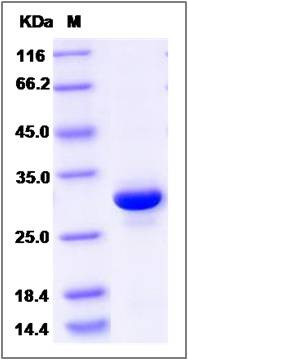Human UBASH3A Protein (aa 354-623, His Tag)
CLIP4,STS-2,TULA,TULA-1
- 100ug (NPP2567) Please inquiry
| Catalog Number | P13847-H07E |
|---|---|
| Organism Species | Human |
| Host | E. coli |
| Synonyms | CLIP4,STS-2,TULA,TULA-1 |
| Molecular Weight | The recombinant human UBASH3A consists of 286 amino acids and predicts a molecular mass of 32.2 KDa. It migrates as an approximately 30 KDa band in SDS-PAGE under reducing conditions. |
| predicted N | His |
| SDS-PAGE |  |
| Purity | > 90 % as determined by SDS-PAGE |
| Protein Construction | A DNA sequence encoding the mature form of human UBASH3A (AAH69511.1) (Ala354-Asn623) was expressed with a polyhistide tag at the N-terminus. |
| Bio-activity | |
| Research Area | Signaling |Signal Transduction |Signaling Pathway |G Protein Signaling |G Protein-Coupled Receptors (GPCRs) |Neurotransmitter G Protein-Coupled Receptors | |
| Formulation | Lyophilized from sterile PBS, pH7.4. 1. Normally 5 % - 8 % trehalose, mannitol and 0.01% Tween80 are added as protectants before lyophilization. Specific concentrations are included in the hardcopy of COA. |
| Background | UBASH3A is a member of the T-cell ubiquitin ligand (TULA) family. This family consists of two members. Both of them can negatively regulate T-cell signaling. UBASH3A can facilitate growth factor withdrawal-induced apoptosis in T cells, which may occur via its interaction with AIF, an apoptosis-inducing factor. Alternative splicing of UBASH3A gene results in multiple transcript variants. It interferes with CBL-mediated down-regulation and degradation of receptor-type tyrosine kinases. UBASH3A promotes accumulation of activated target receptors, such as T-cell receptors, EGFR and PDGFRB, on the cell surface. UBASH3A also exhibits negligigle protein tyrosine phosphatase activity at neutral pH. It may act as a dominant-negative regulator of UBASH3B-dependent dephosphorylation. It may also inhibit dynamin-dependent endocytic pathways by functionally sequestering dynamin via its SH3 domain. |
| Reference |
